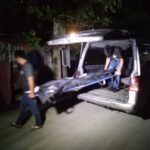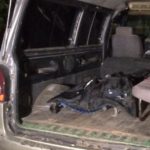“In an ideal world where the police are credible, professional, independent and competent, all possible and plausible angles must be looked into, using scientific methods as tools,” said National Union of Peoples’ Lawyers (NUPL) President Atty. Edre Olalia.
Olalia reacted to a police statement saying the angles they are investigating on the grisly murder of peasant activist Randall Echanis, 72, and his neighbor Louie Tagapia, 48, on August 10 were personal grudge, robbery or that Tagapia was the target and Echanis just got caught in it.
“But in the real world where there is political context and peculiar circumstances and where the track record of the police does not inspire generous trust and confidence, this hypothesis is a naive if not a cop out and bad start on a wrong footing,” said Olalia.
Olalia and other groups earlier questioned the circumstances of Echanis’ death in his rented home in Novaliches, Quezon City where he was brutally murdered, possibly tortured, sustaining one gunshot in the head, 20 stab wounds, and found bound and dead by the neighbor.
All this happened in the dead of night, while there is a strict 10pm to 5am curfew in Quezon City, checkpoints are everywhere, police and military presence have increased since and during the lockdown as Metro Manila and other provinces were again placed under modified enhanced community quarantine from August 4 to 18.
Neighbors also heard the commotion coming from Echanis’ home. Police operatives and barangay personnel arrived hours after, according to witnesses.
“Also, according to eyewitnesses, a foldable ladder was found placed outside the house, a van which was casing his house for a month was seen that night, and one of the armed men who came out was reportedly masked. The PNP dots do not connect,” Olalia added.
Echanis is a well-known National Democratic Front of the Philippines (NDFP) peace consultant.
Peace negotiations aimed to address armed rebellion in the countryside from its roots—poverty, injustice and lack of development—or as peace advocates say, “to achieve peace based on justice.” This is not a simple laying down of arms for as long as there is injustice, there could always be an armed rebellion.
Peace consultants come from various sectors and walks of life and they give their inputs to the peace negotiations so that the agreements in the peace talks could redound to clear and actual benefits for the Filipino people.
For example, four formal rounds of talks and seven meetings in the Philippines produced a common outline for the CASER and common drafts on the sections of agrarian reform and rural development and national industrialization and economic development from 2016 to 2017. But the peace talks were cancelled by President Rodrigo Duterte in 2017 and tagged his counterparts as terrorists, despite that the existence of peace negotiations has ascribed a belligerent status on the NDFP.
The Joint Agreement on Safety and Immunity Guarantees (JASIG), that the NDFP and the Government of the Philippines (GRP) signed in 1995, guarantees the immunity and safety of individuals involved in the peace talks. The identities of peace consultants are withheld to ensure immunity from “surveillance, harassment, search, arrest, detention, prosecution and interrogation or any other similar punitive actions.”
Peace consultants are given “safety conduct passes” to freely go to their groups or constituents to consult and discuss the needs and demands of the people that could be included in the terms of the agreements being threshed out in the peace talks.
To invoke the “safety passes” in times any punitive action was committed against a peace consultant, their party must identify them first. For the other party to verify this, a mechanism in the JASIG is to deposit the list of consultants and identity cards of the consultants in a safety deposit box through a third party and the list can be consulted, after which the release (if in the case of detention) can be effected.
Scores of peace consultants were arrested under the Benigno Aquino III administration and the verification process could not be done because the file was “corrupted” so they were not released and the peace talks barely prospered under the previous administration. Some groups have accused the administration of turning the list of consultants to a “bounty list.”
At least 20 consultants were temporarily released in August 2016 for the resumption of the peace talks under Duterte, as part of goodwill and confidence-building measures (or that the parties are willing to show they would adhere to previously signed agreements). Release of the then-500+ political prisoners was also promised. The released NDFP peace consultants surfaced and they became publicly identifiable since then.
Other consultants who did not come from detention also joined the peace talks. Echanis was not freshly-released that time–he was detained during the Marcos, Arroyo and Aquino administrations and was released in 2010.
Following the end of the talks under Duterte, the GRP also terminated the JASIG in 2017, terminating safety guarantees that are co-terminus with the peace talks. Olalia has held, however, that immunity guarantees remain even if peace talks are terminated.
But since Duterte ended the talks, peace consultants who attended the peace talks were re-arrested such as Adelberto Silva, Vicente Ladlad, Renante Gamara, Rey Casambre and Raffy Baylosis, with human rights groups accusing the police of “planted evidence” and “trumped-up charges.” Randy Malayao was the first to be killed execution-style. Echanis was the second under Duterte.
“So this theory of possible robbery or personal grudge may not only miss the point poorly but could fall into a premeditated bad script for a decoy or distraction to provide, wittingly or unwittingly, a perfect escape for the real perpetrators,” said Olalia.
On August 13, Quezon City Police District (QCPD) finally acknowledged the remains of NDFP peace consultant Randall Echanis after a fingerprint test. The QCPD decided to release the body of Echanis only on August 13 “based on its investigation” and “since no one claimed the body of ‘Manuel Santiago.’”
The police earlier insisted that the dead was not Echanis due to an ID of a “Manuel Santiago” with a photo of Randall Echanis found of the scene. They snatched away Echanis’ remains from the wife and family late night on August 10 because the identity of the body had yet to be confirmed, despite positive identification of the family.
PNP Spokesperspon Bernard Banac said that they don’t see any lapses or violations on the part of the police investigation body. Banac also commended the QCPD for doing its job well “to determine the identity of Echanis through fingerprint analysis.”
In a post, Anakpawis belied the statement of the QCPD that there was no forcible entry in the murder of Echanis.
Contrary to police claim, broken door knob and strike plate were found in the crime scene, indicating a brute force entry.
QCPD's cover-up is the reason why we will never trust them with the investigation. Their lies further the brutal death and injustice of Echanis. https://t.co/LN4Yj15YUB pic.twitter.com/1nffDUx321
— Anakpawis Party-list (@AnakpawisPL) August 13, 2020
Echanis’ remains are now in the Philippine General Hospital for an independent autopsy and the family refused medico-legal examination from the Philippine National Police (PNP).
Echanis was also the National Chairperson of Anakpawis.

































